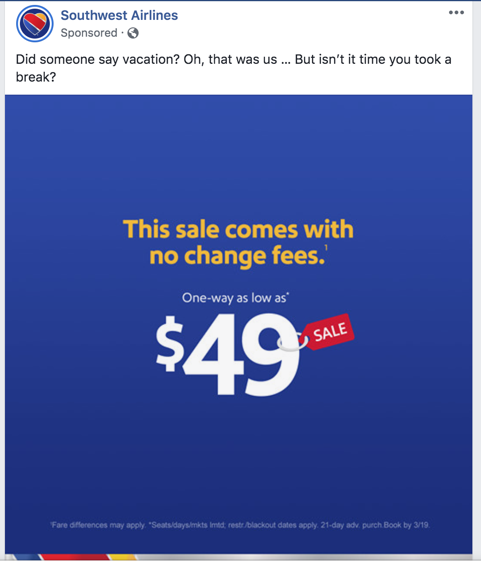How to Avoid Tone-Deaf Content Marketing
The entire world is in a tailspin. If you sit and think about what’s happening long enough, you can work yourself into some pretty extreme mental gymnastics, spinning out grisly post-apocalyptic scenarios that outpace even the wildest science fiction plots. Coronavirus has swiftly lapped the globe, and we’re standing with a mix of legitimate concern, social distancing, questions, fear, panic, hoarding, and empty shelves in our wake. We’re running on high emotion, checking the TV and social media constantly.
As I opened up Facebook this morning, I was hit by a sponsored post from Southwest Airlines. Southwest has been my go-to airline of choice for many years now, so it chafed to read a post that said, “Did someone say vacation? Oh, that was us … But isn’t it time you took a break?

Seriously Southwest? Is March 17, 2020, the day to put that out there? In our state alone, which is faring better than many other states and countries, we are on day who-knows-how-many of scrounging for toilet paper and day two of kids schooling at home. Working from home and worrying about keeping jobs are a reality. Comments to Southwest’s post responded with jibes that showcased the out-of-touch nature of the post and included the snarky comment, “Did someone say Coronavirus?”
When companies market to us in the usual ways during times of crisis, it can appear tone-deaf and self-serving. It leaves us wondering if they have a clue about what our lives are like right now. And yet, companies must continue operating and marketing, and consumers need to keep spending or the economy crashes. And we head into a recession the likes of which we haven’t seen in a very long time.
Digital marketers must avoid tone-deaf content that seems out of touch with reality and “pushes product” without considering what’s going on in the lives of their customers. So what can marketers do to keep moving forward while proactively avoiding tone-deaf digital content? It’s a mix of strategic planning and process-driven execution.
Don’t Just Set It and Forget It
It’s all too easy to plug social content into platforms like HootSuite, Facebook Ads, and Google Ads and let them do their work without tying them into the bigger picture of what’s going on in the world. Check what’s already been scheduled, pull what is questionable, and add new content to address what’s happening now.
Stay Connected
Stay current on what’s happening in current events, on the world stage, and in pop culture. Know your brand influencers and listen to them. Adjust your social media and digital content accordingly. You don’t need to pander to certain viewpoints or audiences, but you can be astute and steer away from, or into if it suits your purposes, controversial areas. It’s better to consciously make decisions about how to handle trending topics and current events than to have them handle you.
Consult Experts
During times of crisis, businesses can be overwhelmed with just keeping the wheels on the bus, so they need extra hands. Plan ahead, vet, and have an experienced partner who can jump in and help you check and double-check all the content pieces that might need to be addressed. Plus, working with an experienced content marketing agency brings your company a variety of viewpoints, experiences, and a global perspective that can round out a myopic approach to content. Having such a partner can save you countless headaches, misspent time, wasted dollars, and annoyed customers.
Plan for Crisis
It’s not a matter of if a crisis or an unexpected event will come, but when. Don’t wait until you are in the middle of a crisis to think about how you will adapt your content. Consider how you will handle local, regional, and world events that could impact your business. Weigh out how to adapt your marketing content in light of various scenarios, including natural disasters, terrrorism, pandemics, economic turns, and scandal. These are not easy things to think about when sales are up and life is good. But that’s when it’s easiest to think clearly and craft parameters for how you will handle content tone and voice and to delineate the rules of engagement around continuing or stopping certain marketing campaigns and activities.
Along with your plan, make a big-picture checklist of the content areas you have on which platforms and what the focus is for each area. Update this checklist quarterly, and put someone in charge of owning it. This way, during a crisis, the information is at hand and someone is intimately familiar with what needs to be changed when. Checklists save lives (and reputations).
Aubrae Wagner
Aubrae Wagner is an experienced content market professional and business performance consultant who helps businesses take a close look at their culture, operations, and marketing to determine what changes they can make to be both happier and more profitable. She has worked with offices in the US and Europe and has helped clients in a variety of industries, from travel and hospitality to software development, the financial sector and wholesaling.



